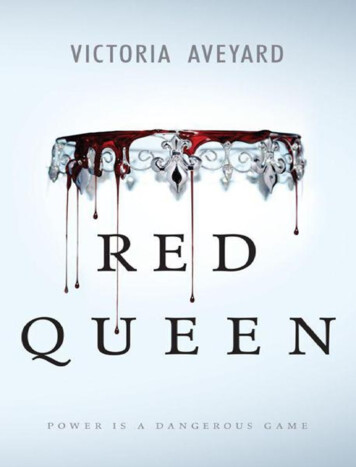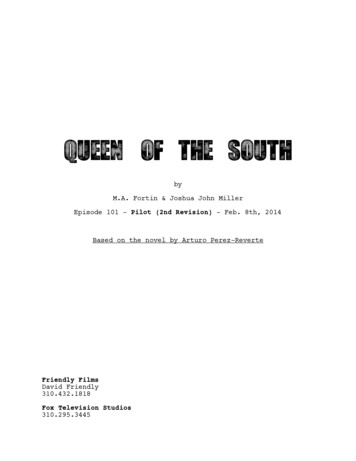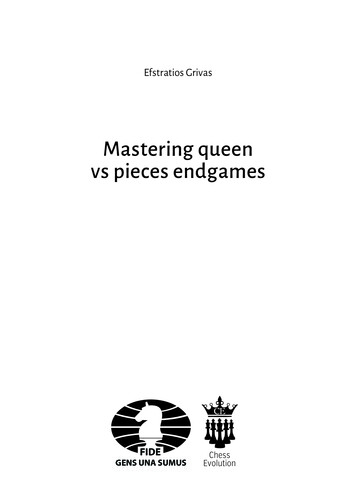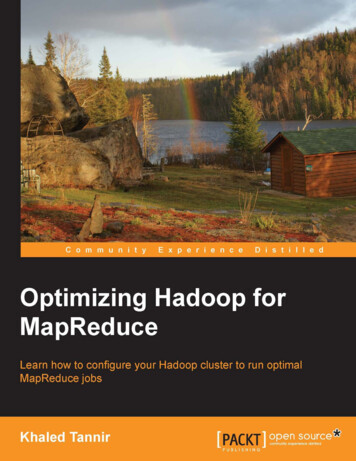
Transcription
DEDICATIONTo Mom, Dad, and Morgan,who wanted to know whathappened next, even when Ididn’t.
CONTENTSDedicationOneTwoThreeFourFiveSixSevenEight
eventeenEighteenNineteenTwentyTwenty-One
sBack AdAbout the AuthorCredits
CopyrightAbout the Publisher
ONEI hate First Friday. It makesthe village crowded, and now,in the heat of high summer,that’s the last thing anyonewants. From my place in theshade it isn’t so bad, but thestink of bodies, all sweatingwith the morning work, isenough to make milk curdle.The air shimmers with heat
and humidity, and even thepuddles from yesterday’sstorm are hot, swirling withrainbow streaks of oil andgrease.The market deflates, witheveryone closing up theirstalls for the day. Themerchants are distracted,careless, and it’s easy for meto take whatever I want fromtheir wares. By the time I’mdone, my pockets bulge with
trinkets and I’ve got an applefor the road. Not bad for afew minutes’ work. As thethrong of people moves, I letmyself be taken away by thehuman current. My hands dartin and out, always in fleetingtouches. Some paper billsfrom a man’s pocket, abracelet from a woman’swrist—nothingtoobig.Villagers are too busyshuffling along to notice a
pickpocket in their midst.The high, stilt buildingsfor which the village isnamed (the Stilts, veryoriginal) rise all around us,ten feet above the muddyground. In the spring thelower bank is underwater, butright now it’s August, whendehydration and sun sicknessstalk the village. Almosteveryone looks forward to thefirst Friday of each month,
when work and school endearly. But not me. No, I’drather be in school, learningnothing in a classroom full ofchildren.Not that I’ll be in schoolmuch longer. My eighteenthbirthday is coming, and withit, conscription. I’m notapprenticed, I don’t have ajob, so I’m going to be sent tothe war like all the other idleones. It’s no wonder there’s
no work left, what with everyman, woman, and child tryingto stay out of the army.My brothers went to warwhen they turned eighteen, allthree of them sent to fightLakelanders. Only Shade canwrite worth a lick, and hesends me letters when he can.I haven’t heard from my otherbrothers, Bree and Tramy, inover a year. But no news isgood news. Families can go
years without hearing a thing,only to find their sons anddaughters waiting on the frontdoorstep, home on leave orsometimesblissfullydischarged. But usually youreceive a letter made of heavypaper, stamped with theking’s crown seal below ashort thank-you for yourchild’s life. Maybe you evenget a few buttons from theirtorn, obliterated uniforms.
I was thirteen when Breeleft. He kissed me on thecheek and gave me a singlepair of earrings for my littlesister, Gisa, and me to split.They were dangling glassbeads, the hazy pink color ofsunset. We pierced our earsourselves that night. Tramyand Shade kept up thetradition when they went.Now Gisa and I have one eareach set with three tiny stones
to remind us of our brothersfighting somewhere. I didn’treally believe they’d have togo, not until the legionnairein his polished armor showedup and took them away oneafter another. And this fall,they’ll come for me. I’vealready started saving—andstealing—to buy Gisa someearrings when I go.Don’t think about it.That’s what Mom always
says, about the army, aboutmybrothers,abouteverything. Great advice,Mom.Down the street, at thecrossing of Mill and Marcherroads, the crowd thickens andmore villagers join thecurrent. A gang of kids, littlethieves in training, fluttersthrough the fray with sticky,searching fingers. They’re tooyoung to be good at it, and
Security officers are quick tointervene. Usually the kidswould be sent to the stocks,or the jail at the outpost, butthe officers want to see FirstFriday. They settle for givingthe ringleaders a few harshknocks before letting themgo. Small mercies.The tiniest pressure at mywaist makes me spin, actingon instinct. I grab at the handfoolish enough to pickpocket
me, squeezing tight so thelittle imp won’t be able to runaway. But instead of ascrawny kid, I find myselfstaring up at a smirking face.KilornWarren.Afisherman’s apprentice, a warorphan, and probably my onlyreal friend. We used to beateach other up as children, butnow that we’re older—andhe’s a foot taller than me—Itry to avoid scuffles. He has
his uses, I suppose. Reachinghigh shelves, for example.“You’re getting faster.”He chuckles, shaking off mygrip.“Oryou’regettingslower.”He rolls his eyes andsnatches the apple out of myhand.“Are we waiting forGisa?” he asks, taking a biteof the fruit.
“She has a pass for theday. Working.”“Then let’s get moving.Don’t want to miss theshow.”“And what a tragedy thatwould be.”“Tsk, tsk, Mare,” heteases, shaking a finger at me.“This is supposed to be fun.”“It’s supposed to be awarning, you dumb fool.”But he’s already walking
off with his long strides,forcing me to almost trot tokeep up. His gait weaves, offbalance. Sea legs, he callsthem, though he’s never beento the far-off sea. I guess longhours on his master’s fishingboat, even on the river, arebound to have some effect.Like my dad, Kilorn’sfather was sent off to war, butwhereasminereturnedmissing a leg and a lung, Mr.
Warren came back in a shoebox. Kilorn’s mother ran offafter that, leaving her youngson to fend for himself. Healmost starved to death butsomehow kept picking fightswith me. I fed him so that Iwouldn’t have to kick arounda bag of bones, and now, tenyears later, here he is. At leasthe’s apprenticed and won’tface the war.We get to the foot of the
hill, where the crowd isthicker, pushing and proddingon all sides. First Fridayattendance is mandatory,unless you are, like my sister,an “essential laborer.” As ifembroidering silk is essential.But the Silvers love their silk,don’t they? Even the Securityofficers, a few of themanyway, can be bribed withpieces sewn by my sister. Notthat I know anything about
that.The shadows around usdeepen as we climb up thestone stairs, toward the crestof the hill. Kilorn takes themtwo at a time, almost leavingme behind, but he stops towait. He smirks down at meand tosses a lock of faded,tawny hair out of his greeneyes.“Sometimes I forget youhave the legs of a child.”
“Better than the brain ofone,” I snap, giving him alight smack on the cheek as Ipass. His laughter follows meup the steps.“You’re grouchier thanusual.”“I just hate these things.”“I know,” he murmurs,solemn for once.And then we’re in thearena, the sun blazing hotoverhead. Built ten years ago,
the arena is easily the largeststructure in the Stilts. It’snothing compared to thecolossal ones in the cities, butstill, the soaring arches ofsteel, the thousands of feet ofconcrete, are enough to makea village girl catch her breath.Security officers areeverywhere, their black-andsilver uniforms standing outin the crowd. This is FirstFriday, and they can’t wait to
watch the proceedings. Theycarry long rifles or pistols,though they don’t need them.As is customary, the officersare Silvers, and Silvers havenothing to fear from us Reds.Everyone knows that. We arenot their equals, though youwouldn’t know it fromlooking at us. The only thingthat serves to distinguish us,outwardly at least, is thatSilvers stand tall. Our backs
are bent by work andunanswered hope and theinevitabledisappointmentwith our lot in life.Inside the open-toppedarena is just as hot as out, andKilorn, always on his toes,leads me to some shade. Wedon’t get seats here, just longconcrete benches, but the fewSilver nobles up above enjoycool, comfortable boxes.There they have drinks, food,
ice even in high summer,cushioned chairs, electriclights, and other comforts I’llnever enjoy. The Silversdon’t bat an eye at any of it,complainingaboutthe“wretched conditions.” I’llgive them a wretchedcondition, if I ever have thechance. All we get are hardbenches and a few screechyvideo screens almost toobright and too noisy to stand.
“Bet you a day’s wagesit’s another strongarm today,”Kilorn says, tossing his applecore toward the arena floor.“No bet,” I shoot back athim. Many Reds gamble theirearnings on the fights, hopingto win a little something tohelp them get through anotherweek. But not me, not evenwith Kilorn. It’s easier to cutthe bookie’s purse than try towin money from it. “You
shouldn’t waste your moneylike that.”“It’s not a waste if I’mright. It’s always a strongarmbeating up on someone.”Strongarms usually makeup at least one-half of thefights, their skills and abilitiesbetter suited to the arena thanalmost any other Silver. Theyseem to revel in it, using theirsuperhuman strength to tossother champions around like
rag dolls.“What about the otherone?” I ask, thinking aboutthe range of Silvers that couldappear.Telkies,swifts,nymphs, greenys, stoneskins—all of them terrible towatch.“Not sure. Hopefullysomething cool. I could usesome fun.”Kilorn and I don’t reallysee eye to eye on the Feats of
First Friday. For me,watching two champions ripinto each other is notenjoyable, but Kilorn loves it.Let them ruin each other, hesays. They’re not our people.He doesn’t understandwhat the Feats are about. Thisisn’t mindless entertainment,meant to give us some respitefrom grueling work. This iscalculated, cold, a message.Only Silvers can fight in the
arenas because only a Silvercan survive the arena. Theyfight to show us their strengthand power. You are no matchfor us. We are your betters.We are gods. It’s written inevery superhuman blow thechampions land.And they’re absolutelyright. Last month I watched aswift battle a telky and,though the swift could movefaster than the eye could see,
the telky stopped him cold.With just the power of hismind, he lifted the otherfighter right off the ground.The swift started to choke; Ithink the telky had someinvisible grip on his throat.When the swift’s face turnedblue, they called the match.Kilorn cheered. He’d bet onthe telky.“Ladies and gentlemen,Silvers and Reds, welcome to
First Friday, the Feat ofAugust.” The announcer’svoice echoes around thearena, magnified by the walls.He sounds bored, as usual,and I don’t blame him.Once, the Feats were notmatches at all, but executions.Prisoners and enemies of thestate would be transported toArcheon, the capital, andkilled in front of a Silvercrowd. I guess the Silvers
liked that, and the matchesbegan. Not to kill but toentertain. Then they becamethe Feats and spread out tothe other cities, to differentarenasanddifferentaudiences. Eventually theReds were granted admission,confined to the cheap seats. Itwasn’t long until the Silversbuilt arenas everywhere, evenvillages like the Stilts, andattendance that was once a
gift became a mandatorycurse. My brother Shade saysit’s because arena citiesenjoyed a marked reductionin Red crime, dissent, eventhe few acts of rebellion.Now Silvers don’t have to useexecution or the legions oreven Security to keep thepeace; two champions canscare us just as easily.Today, the two inquestion look up to the job.
The first to walk out onto thewhite sand is announced asCantos Carros, a Silver fromHarbor Bay in the east. Thevideo screen blares a clearpicture of the warrior, and noone needs to tell me this is astrongarm. He has arms liketree trunks, corded and veinedand straining against his ownskin. When he smiles, I cansee all his teeth are gone orbroken. Maybe he ran afoul
of his own toothbrush whenhe was a growing boy.Next to me, Kilorn cheersand the other villagers roarwith him. A Security officerthrows a loaf of bread at thelouder ones for their trouble.To my left, another hands ascreaming child a brightyellow piece of paper. ’Lecpapers—extraelectricityrations. All of it to make uscheer, to make us scream, to
force us to watch, even if wedon’t want to.“That’s right, let him hearyou!” the announcer drawls,forcing as much enthusiasminto his voice as he can. “Andhere we have his opponent,straight from the capital,Samson Merandus.”The other warrior lookspale and weedy next to thehuman-shapedhunkofmuscle, but his blue steel
armor is fine and polished toa high sheen. He’s probablythe second son of a secondson, trying to win renown inthe arena. Though he shouldbe scared, he looks strangelycalm.His last name soundsfamiliar, but that’s notunusual. Many Silvers belongto famous families, calledhouses, with dozens ofmembers. The governing
family of our region, theCapital Valley, is HouseWelle, though I’ve never seenGovernor Welle in my life.He never visits it more thanonce or twice a year, andeven then, he never stoops toentering a Red village likemine. I saw his riverboatonce, a sleek thing withgreen-and-gold flags. He’s agreeny, and when he passed,the trees on the bank burst
into blossom and flowerspopped out of the ground. Ithought it was beautiful, untilone of the older boys threwrocks at his boat. The stonesfell harmlessly into the river.They put the boy in the stocksanyway.“It’ll be the strongarm forsure.”Kilorn frowns at the smallchampion. “How do youknow? What’s Samson’s
power?”“Who cares, he’s stillgoing to lose,” I scoff,settling in to watch.The usual call rings outover the arena. Many rise totheir feet, eager to watch, butI stay seated in silent protest.As calm as I might look,anger boils in my skin.Anger, and jealousy. We aregods, echoes in my head.“Champions, set your
feet.”They do, digging in theirheels on opposite sides of thearena. Guns aren’t allowed inarena fights, so Cantos drawsa short, wide sword. I doubthe’ll need it. Samsonproduces no weapon, hisfingers merely twitching byhis side.A low, humming electrictone runs through the arena. Ihate this part. The sound
vibrates in my teeth, in mybones, pulsing until I thinksomething might shatter. Itends abruptly with a chirpingch
They were dangling glass beads, the hazy pink color of sunset. We pierced our ears ourselves that night. Tramy and Shade kept up the tradition when they went. Now Gisa and I have one ear each set with three tiny stones. to remind us of our brothers fighting somewhere. I didn’t really believe they’d have to go, not until the legionnaire in his polished armor showed up and took them away one .











